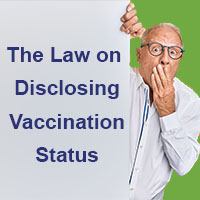Posted By Amanda Girard On July 20, 2021
Do Individuals have to Disclose Vaccination Status?

The COVID-19 pandemic has presented a controversy about “vaccine passports”, medical privacy laws and individual rights. As the Centers for Disease Control (CDC) eases restrictions on individuals vaccinated against Coronavirus, many companies and individuals are asking for individuals to disclose vaccination status. HIPAA is often cited as a justification to avoid disclosing that vaccination status; however, there are common misconceptions on what HIPAA actually covers as protections for medical information. As part of helping community members make informed decisions on getting vaccinated, it is important that medical providers offer clarity on this subject. Patients should know the negative consequences of not getting vaccinated in addition to the benefits of getting the COVID-19 vaccine. These conversations are an important part of increasing vaccination in our communities.
The Health Insurance Portability and Accountability Act of 1996, also known as HIPAA, provides safeguards to protect an individual’s identifiable health information from being disclosed without their knowledge or consent. This legislation only applies to certain health-related businesses, however. Those businesses include insurance companies, healthcare clearinghouses, healthcare providers, and business connections. Your doctor, for example, cannot disclose your medical information without your express consent. There are other federal and state privacy regulations that may force employers and schools to secure personal information as well. Otherwise, HIPAA and no other federal law prohibits private enterprises that serve the public from requiring personnel and customers to get vaccinated or from anyone else to ask about vaccination status.
Some people are hesitant to disclose their vaccination status, and everyone has the right to not disclose. There most certainly would be consequences of not disclosing, however. Families and friend groups can ask for individuals to disclose their vaccination status before visiting. An employer can ask and even require an individual to get the vaccine as a condition of employment. HIPAA does not prevent a business from denying a person entry if they refuse to disclose vaccination status also. While businesses cannot deny service because of color or gender, there is no regulation that says companies cannot discriminate based on an individual’s COVID-19 vaccination status during the pandemic.
The Equal Employment Opportunity Commission (EEOC) oversees federal anti-discrimination rules in the workplace. They released an advisory concerning employers asking about vaccination status. They stated that “there is no indication that an employer asking this question would be violating any federal law. If an employer’s efforts to find out why a worker didn’t get vaccinated elicits information regarding a disability, it might be a violation.”
It is important that patients understand how vaccination status affects their ability to return to life with eased restrictions. Not getting vaccinated and being willing to disclose that information can affect their ability to enjoy services, spend time with loved ones or be employed. Be sure that your patients’ understand these limitations on the law’s protections about being asked to disclose vaccination status so they can make informed decisions on being vaccinated against COVID-19.



